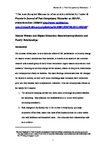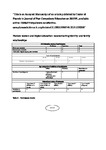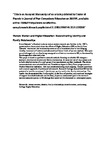Mature women and higher education: reconstructing identity and family relationships
| dc.contributor.author | Webber, L | |
| dc.date.accessioned | 2017-11-24T17:17:10Z | |
| dc.date.available | 2017-11-24T17:17:10Z | |
| dc.date.issued | 2015-04-03 | |
| dc.identifier.issn | 1359-6748 | |
| dc.identifier.issn | 1747-5112 | |
| dc.identifier.uri | http://hdl.handle.net/10026.1/10271 | |
| dc.description.abstract |
Since Edwards’ influential study on mature women students and families in the 1990s, questions have been raised about the effects of Higher Education (HE) on family lives. Edwards maintained that relationships were at risk of breakdown due to the changing identity, increased self-esteem and enhanced confidence levels of women students. Men were perceived negatively as often being unsupportive of their wives’ return to HE, or threatened by the changes they observed in her. This paper is based on qualitative research methods focusing on whether HE changes a woman’s identity and reconstructs family relationships. A narrative line of inquiry was used to build detailed stories of a small group of women students and their husbands. The 11 women students were selected from one Foundation degree in Early Years programme at a further education institution. Data was constructed using mind mapping, focused interviews and a mosaic approach of participant-led research. Research findings showed that HE had the potential to transform a woman’s identity and position within her family relationships. The results also demonstrated that family capital, in the form of practical and emotional strategies of support from both husbands and children, played an instrumental part in the women’s success and participation in HE (though this aspect will be discussed in a subsequent paper). | |
| dc.format.extent | 208-226 | |
| dc.language | en | |
| dc.language.iso | en | |
| dc.publisher | Informa UK Limited | |
| dc.subject | Mind and Body | |
| dc.subject | Clinical Research | |
| dc.title | Mature women and higher education: reconstructing identity and family relationships | |
| dc.type | journal-article | |
| dc.type | Journal Article | |
| plymouth.issue | 2 | |
| plymouth.volume | 20 | |
| plymouth.publication-status | Published | |
| plymouth.journal | Research in Post-Compulsory Education | |
| dc.identifier.doi | 10.1080/13596748.2015.1030260 | |
| plymouth.organisational-group | /Plymouth | |
| plymouth.organisational-group | /Plymouth/Faculty of Arts, Humanities and Business | |
| plymouth.organisational-group | /Plymouth/Faculty of Arts, Humanities and Business/Plymouth Institute of Education | |
| plymouth.organisational-group | /Plymouth/REF 2021 Researchers by UoA | |
| plymouth.organisational-group | /Plymouth/REF 2021 Researchers by UoA/UoA23 Education | |
| plymouth.organisational-group | /Plymouth/Users by role | |
| plymouth.organisational-group | /Plymouth/Users by role/Academics | |
| dc.identifier.eissn | 1747-5112 | |
| dc.rights.embargoperiod | Not known | |
| rioxxterms.versionofrecord | 10.1080/13596748.2015.1030260 | |
| rioxxterms.licenseref.uri | http://www.rioxx.net/licenses/all-rights-reserved | |
| rioxxterms.type | Journal Article/Review |




